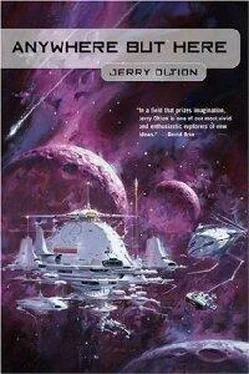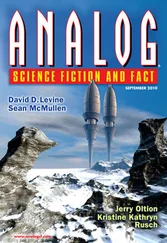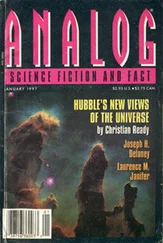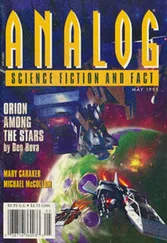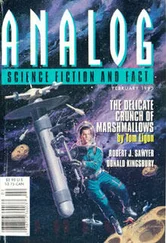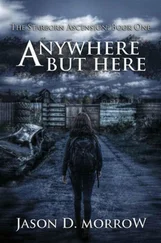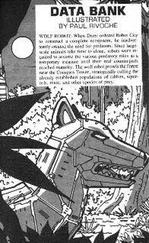And while they drove, Katata told them what life was like on her home planet, Bekat. They started out with no words in common besides “ti” and “bakbak” and “gatsa,” but it was amazing what she could convey through pantomime, and with each concept Trent and Donna understood, she taught them a word to go with it so she wouldn’t have to pantomime it again.
Apparently a spaceship had fallen out of the sky on Bekat about a hundred days ago. The astronauts—humans, if Trent understood the pointing at him and at the starry sky—had given the secret of the hyperdrive to the aliens, who had immediately begun blinking out on interstellar jumps of their own. Those who could build a spaceship without getting it stolen first, anyway. There was either a war going on, or the place was nothing but bandits and guerrillas fighting over the last dregs of civilization, Trent couldn’t figure out for sure which, but if he understood Katata right, everybody who could get out was doing so. Problem was, the army—or the bandits—knew that, and were actively hunting down and killing anybody who tried to leave.
“That’s nuts,” Trent said when he finally understood the situation. “If people want to move out, let ’em go.”
“So says the guy from the United States,” Donna said.
“Yeah, well, at least our government only shoots at us on the way back .”
Donna got a thoughtful look on her face.
“What?” he asked her.
“I wonder if it’s a racial thing? Or religious. Maybe the people in power don’t want the other guys to get a leg up somewhere else.”
That was possible. Humans certainly acted that way if you gave them the chance. Right after Allen dropped the hy-perdrive plans on Earth, people had been afraid that the first nation to get a colony started would nuke the rest of the world to prevent anyone else from getting away. Those fears had been well grounded, too. Several countries had actually started throwing bombs before the Galactic Federation put a stop to it. There was no reason to assume that aliens would be any more civilized.
Were Katata and her family refugees? The stuff they had brought with them certainly didn’t look like the sort of belongings a rich family would take with them to the stars. They were obviously farmers, and not terrifically well-off ones at that. Just the sort of folks who, among humans, anyway, always wound up doing the grunt work while the fat cats skimmed off any profit they might make.
Trent wondered how they would fare on Onnescu. There wasn’t much government here to speak of, certainly no immigration police or any of that, but things would change. They would have to. Onnescu was probably one of the fastest growing population centers in the galaxy at the moment. It was the closest planet to Earth, one of the most Earthlike yet discovered, it didn’t have any intelligent natives living on it, and the people who had already moved here actually wanted more people to join them. Their goal, or so they said in their flyer, was to start a new society using all the best ideas from Earths history, and build a second Earth without all the environmental problems and social problems of the first one. An admirable goal, Trent thought, and probably much more difficult to realize than the colonists expected, but even if they fell short of the entire picture, they could still wind up with something a hell of a lot better than back home.
He wondered if they had counted on immigration from beyond Earth. Not that it should matter, but he bet it would to some people. Even so, Katata and her family probably stood a better chance here than on a planet where people tried to kill you for getting out. By the time the notion of racial purity raised its ugly head here, they would already be locals.
Their biggest problem was going to be the slime. The whole right side of Trent’s pickup cab was dripping with the stuff. Every time he hit a bump, the aliens would lurch against the door or the dashboard—or against Donna—and every time they did, they left a fresh smudge of goo. Donna was starting to look like a Jell-O wrestler on her right side, and Trent was beginning to wonder if they would ever get the stuff out of the seat. Katata and her kids didn’t even seem to notice that they were doing it, which meant it was probably a normal thing for them and not just a reaction to stress, and if that was the case, then they were going to have a hard time dealing with humans. Trent didn’t mind getting his pickup slimed for a good cause, but he doubted if people would put up with it on a regular basis.
Maybe they could keep a tarp handy. If Trent had been thinking quicker, he could have done that here. But even that was probably more than most people would be willing to do. Just went to show, there were always complications no matter where you went.
Trent kept all the lights on while he drove. They rolled through a hundred-yard circle of near-daylight, making good time when they found a smooth stretch and slowing to get through the rocky parts. Trent radioed ahead and asked if there was a road already cut through the Greenwall, and Greg talked them toward the closest of three that he knew of. It was a couple of miles out of their way, but it was worth the detour; once they found the notch in the trees and forded the stream, they picked up a track they could follow all the way to Bigtown. It wasn’t much at first, but it was better than nothing, and the closer they got to town, the more well defined it became. It had even been smoothed out in places.
Even so, it was well after midnight local time when they saw their first house lights. The outlying homesteads were spread quite a ways apart, but they drew closer together as Trent kept driving, until eventually the pickup was rolling down a wide city street with houses on either side. The street wasn’t paved, but it was straight and relatively smooth, except for the mudholes, which grew more and more common closer to the center of town. Trent grinned as he powered through them, throwing big sheets of mud out to the sides and up over the hood. Katata and her children squealed in alarm the first time it happened, but Talana’s squeal changed its pitch the second time, and Katata’s echoed her child’s the time after. Pretty soon everyone was doing it, and then Donna taught them how to shout “Woo-hoo!”
The center of town was all shops, bars, restaurants, and hotels. Some of them were wooden frame buildings like any others back home, but others were made of rough-hewn logs like old homestead cabins, and one was made of round river rock cemented together like an old Scottish castle. There was a log bridge over the river itself, and more businesses beyond. A few trees stood here and there, especially near the river, but Trent saw more stumps than live ones.
It was hard to believe that this was all less than five months old. Trent had heard how frontier towns had grown up practically overnight in the American West, but he had never really understood the magnitude of what people could do when they put some serious effort into it. These people clearly didn’t want to live in a rural backwater; they wanted a town . They just didn’t want it to be on Earth.
Some of the inhabitants were out and about. People waved and called out to them from the doorways of bars as they rolled past, and Trent slowed down so he wouldn’t splash mud all over them. The streets downtown were churned to a froth by all the traffic, to the point where Trent wondered if he was going to get through the muck with only three drive wheels, but the pickup wallowed through it in fine form, and a few blocks past the river they rose up onto drier ground again.
Greg talked them in to the hospital—a squat log building on a side street about six blocks north of the center of town. The exterior looked like a dude ranch bunkhouse, but lights blazed from its windows, and big blue signs pointed to the emergency entrance. Trent parked close to the doors and set the brake.
Читать дальше
